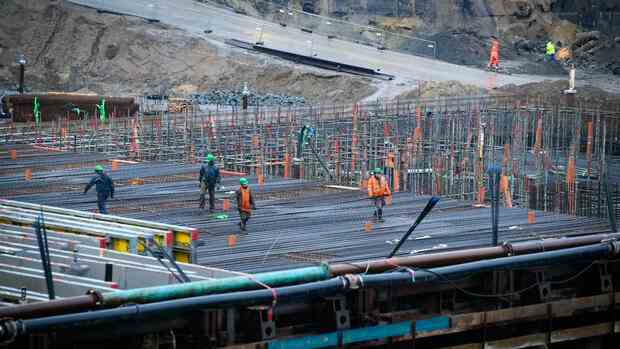Since 1997, there has been an industry minimum wage in the main construction trades, which has also had an impact on other sectors of the economy.
(Photo: dpa)
Berlin Sectoral minimum wages and collective bargaining agreements can help to ensure that wages also rise in sectors of the economy that are not covered at all. Because the salary transparency created in this way prompts employees to question their own payment and, if necessary, to look for a new job. This shows a study by the Essen economic research institute RWI, which is available to the Handelsblatt.
The economist Gökay Demir has examined the effects of the introduction of the first sector-specific minimum wage in the construction industry on employees in other sectors. There, with effect from January 1, 1997, a lower wage limit of the equivalent of 8.69 euros in West Germany and 8 euros in East Germany was introduced.
As the RWI shows, the reporting on the project had a signal effect on employees in similar jobs and with comparable qualifications outside of the construction industry, who previously earned less. Because as early as 1996, the year before the industry minimum wage came into effect, employees who, given the wage transparency that had been created, had the impression that they were selling their work below value, increasingly switched to companies with better pay.
Demir has observed a particularly strong effect among employees who tend to be less well informed about the labor market and wages, such as migrants or job starters.
Top jobs of the day
Find the best jobs now and
be notified by email.
The initial question of the study was why employees stay in companies even though they earn little there. One reason could be an information asymmetry: They simply do not know that elsewhere they pay significantly more for a comparable job. This asymmetry was eliminated by reporting on the construction minimum wage.
Announcement of collective wages
According to the study, a policy aimed at introducing and publicly announcing collectively agreed wages could make it easier for employees to switch to better-paying and usually more productive jobs. In addition to the lower wage limit in the construction industry, there is now a whole series of industry-specific minimum wages.
>> Read here: The minimum wage for nursing care will rise to a good 14 euros by the end of next year
Before the election, the SPD and the Greens had also campaigned for the federal government to be able to more easily declare collective agreements to be generally binding, so that they apply to an entire industry. In the coalition agreement, the traffic light groups also agreed that public contracts from the federal government should in future only go to companies that adhere to the collective bargaining agreement.
The Pay Transparency Act, which came into force in July 2017, also aims to provide a better perspective on the subject of payment. It is primarily intended to help women who feel that they are being paid too little compared to their male colleagues. According to the Federal Statistical Office, women workers recently earned around six percent less than men (adjusted gender pay gap) for comparable work and qualifications.
>> Read here: Income – Men and women are so different at the end of their working lives
According to the RWI analysis, employees who looked for better-paid work after the announcement of the minimum wage for construction then earned an additional 380 euros a year. That is quite a relevant magnitude, since their annual income before that was only an average of 19,200 euros.
More: Minus 5.7 percent: Real wages fall significantly due to inflation in the third quarter
